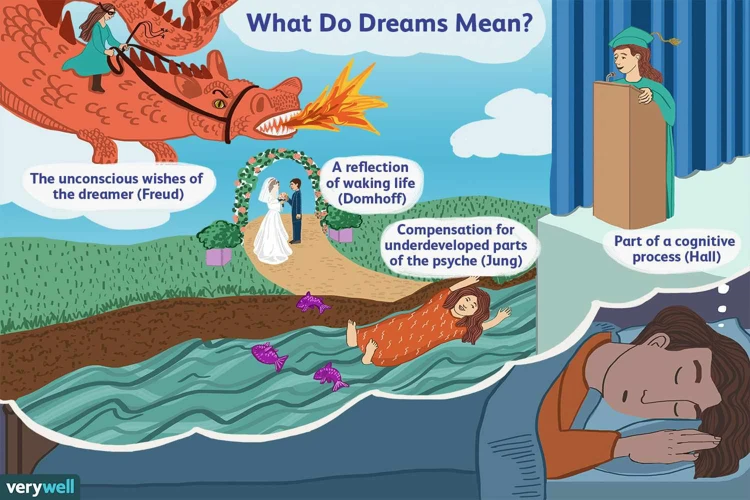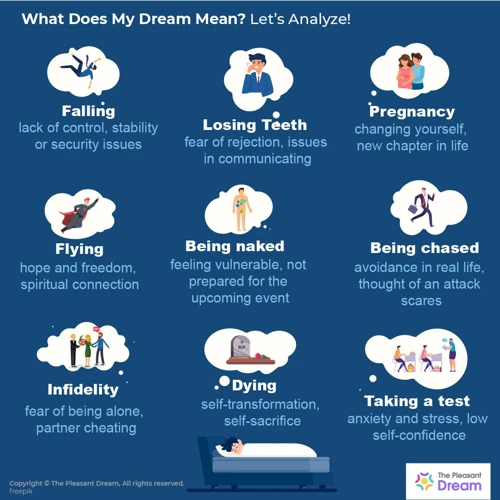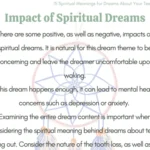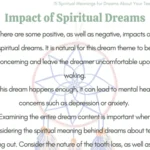Have you ever woken up from a vivid dream, wondering what it all meant? Dreams have long been a source of fascination and mystery, with their intricate narratives and symbolism. Understanding the intricacies of the dream cycle sleep and the significance of our dreams can provide valuable insights into our subconscious mind. This article delves into the stages of the dream cycle, the psychological and symbolic meanings of dreams, common dream themes, and how daily life influences our dreams. Whether you are curious about the interpretations of falling, being chased, or teeth falling out in your dreams, or simply want to explore the depths of your own subconscious, join us on a journey through the world of dream analysis.
What is the Dream Cycle?

The dream cycle refers to the series of stages that our brain goes through during sleep, characterized by different patterns of brain activity and eye movements. These stages, known as sleep cycles, are crucial for overall well-being and mental health. One complete sleep cycle consists of four stages: Stage 1, Stage 2, Stage 3, and REM (Rapid Eye Movement) sleep. Each stage plays a unique role in the body’s restorative processes. While we often associate dreams with REM sleep, they can occur in any stage of the dream cycle. Understanding the different stages of sleep and their contribution to the dream cycle can help us unravel the mysteries of our dreams and gain deeper insight into our inner thoughts and emotions.
Stages of the Dream Cycle
The stages of the dream cycle are a series of distinct phases that our brain goes through during sleep. These stages include Stage 1, Stage 2, Stage 3, and REM (Rapid Eye Movement) sleep. In Stage 1, which is the lightest stage of sleep, we may experience drifting thoughts and fleeting images. As we transition into Stage 2, our brain activity slows down, and our body prepares for deeper sleep. Stage 3, also known as deep sleep or slow-wave sleep, is characterized by slow brain waves and is essential for physical restoration and rejuvenation. Finally, REM sleep, which occurs after approximately 90 minutes of sleep, is when most vivid dreaming occurs. During REM sleep, our brain activity increases, resembling that of being awake. It is in this stage that we may experience intense emotions and vivid dream scenarios, such as being chased by an elephant. Understanding the different stages of the dream cycle can help us recognize the patterns and variations in our dream experiences.
REM and Non-REM Sleep
REM (Rapid Eye Movement) and non-REM sleep are the two main states of sleep that make up the dream cycle. Non-REM sleep consists of three stages: Stage 1, Stage 2, and Stage 3. Stage 1 is a transitional phase between wakefulness and sleep, characterized by slow eye movements and muscle relaxation. In Stage 2, our brain waves slow down and our body temperature drops. Deep sleep, also known as Stage 3 or slow-wave sleep, is the stage where our body repairs and regenerates. REM sleep, on the other hand, is the stage where most dreaming occurs. During this stage, our brain activity increases, and our eyes move rapidly from side to side. REM sleep is essential for cognitive processes, memory consolidation, and emotional regulation. It’s important to note that while dreams can take place in all stages of sleep, REM sleep is often associated with more vivid and story-like dreams.
The Significance of Dreams

Dreams hold great significance in our lives, serving as windows into our subconscious mind. They can provide valuable insights into our emotions, fears, desires, and unresolved issues. Psychologically, dreams help us process and integrate daily experiences and emotions. They can act as a coping mechanism, allowing us to explore and work through unresolved conflicts or anxieties. Spiritually, dreams are often seen as messages from a higher power or the universe, offering guidance or symbolism that can aid in personal growth and self-discovery. Symbolic meanings in dreams can vary greatly depending on cultural contexts and personal experiences. Exploring the significance of dreams can help us gain a deeper understanding of ourselves and navigate life’s challenges with greater awareness and insight.
Psychological Interpretation
Psychological interpretation of dreams involves analyzing the content and symbolism of dreams to gain insights into a person’s unconscious mind and emotions. According to Sigmund Freud, dreams are the “royal road to the unconscious” and can reveal repressed desires, conflicts, and unresolved issues. A professional dream analyst or psychologist may use various techniques such as free association and dream analysis to interpret the meaning behind specific dream elements. For example, dreaming about a lost child may represent deep-seated fears or anxieties related to parenthood or feelings of vulnerability. Exploring the psychological interpretations of our dreams can provide valuable self-reflection and self-discovery, helping us better understand our thoughts, emotions, and motivations.
Spiritual and Symbolic Meaning
Dreams have long been associated with spiritual and symbolic meanings across different cultures and belief systems. Many people believe that dreams provide a window into our deeper spiritual selves and can offer guidance or messages from the divine. Symbols that appear in dreams often carry significant meaning. For example, dreaming about an elephant may symbolize strength, wisdom, or overcoming obstacles. Another common symbolic dream theme is water, which is often associated with emotions and the unconscious mind. It is important to remember that the interpretation of these symbols can vary based on personal experiences and cultural backgrounds. Within the realm of dreams, each symbol can hold a unique significance that reflects the dreamer’s own spiritual journey.
Common Dream Themes and Interpretations

Common dream themes often hold symbolic meanings that can provide insights into our subconscious thoughts and emotions. Some of these themes include falling and flying, being chased or pursued, teeth falling out, and nudity or being undressed in public. When we dream of falling or flying, it can reflect our sense of control or lack thereof in waking life. Being chased or pursued in a dream may represent unresolved fears or anxieties. Dreams about teeth falling out can be associated with feelings of powerlessness or a loss of confidence. Nudity or being undressed in public dreams might indicate vulnerability or a fear of being exposed. Each dream theme can have different interpretations based on the individual’s unique experiences and emotions. Exploring these dream themes and understanding their possible meanings can provide valuable insights into our inner selves and help us navigate our waking lives with greater awareness.
Falling and Flying
- Falling: Falling dreams are one of the most common dream themes and can evoke a sense of fear or unease. Symbolically, falling in dreams often represents a loss of control or a feeling of insecurity in waking life. It may indicate a fear of failure, a lack of stability, or unresolved anxieties. Exploring the circumstances and emotions surrounding the fall can provide valuable insight into the areas of your life where you may feel out of control or uncertain.
- Flying: Flying dreams, on the other hand, evoke a sense of freedom and empowerment. Dreaming of flying often represents a desire for liberation and breaking free from limitations or constraints in life. It can symbolize personal growth, ambition, and the ability to rise above challenges. Flying dreams may also indicate a need to escape from a difficult situation or gain a new perspective. Embracing the exhilarating sensation of flying in your dreams can inspire a sense of confidence and optimism in your waking life.
Being Chased or Pursued
Being chased or pursued is a common dream theme that can evoke feelings of fear and anxiety. This dream scenario often symbolizes a sense of insecurity or the avoidance of an issue in our waking lives. The person or object chasing us in the dream may represent something we are trying to escape or confront. It’s important to pay attention to the details of the chase, as they can provide valuable insights into the underlying emotions and situations we may be facing. For example, if you find yourself being chased by an elephant in your dream, it may signify a looming challenge or an overwhelming situation that you are trying to evade. Analyzing and reflecting on dreams of being chased can provide a deeper understanding of our fears and help us confront them in our waking lives.
Teeth Falling Out
One common dream theme that many people experience is the sensation of their teeth falling out. This dream can evoke a sense of panic or unease, as losing teeth is often associated with loss or vulnerability. Despite the unsettling nature of this dream, it is important to remember that dream interpretations are subjective and can vary from person to person. In some psychological interpretations, dreaming about teeth falling out may reflect feelings of powerlessness or a fear of aging. Others may attribute the dream to stress or anxiety in one’s waking life. Exploring the symbolism and personal meaning behind this dream theme can provide valuable insights into one’s emotional state and inner fears.
Nudity or Being in Public Undressed
Nudity or being in public undressed is a common dream theme that can evoke feelings of vulnerability and embarrassment. When we dream of being naked or exposed in public, it often reflects our fear of being judged or criticized. This dream may stem from feelings of insecurity or a lack of confidence in our waking lives. It can also symbolize a desire for authenticity and the need to let go of societal expectations and masks. The interpretation of this dream can vary depending on the context and the emotions associated with it. Exploring the underlying emotions and identifying any related experiences or situations in our waking life can help us better understand the meaning behind this common dream theme.
Influence of Daily Life on Dreams

Our daily life experiences and emotions can greatly influence the content and themes of our dreams. Stress and anxiety, for example, often manifest in our dreams as situations where we feel overwhelmed, chased, or unable to escape. If you have been dealing with a particularly stressful situation, such as a demanding job or personal turmoil, it is not uncommon for these issues to appear in your dreams. These dreams provide a window into your subconscious mind, allowing you to process and release some of the stress and tension that you may be experiencing.
Emotional experiences throughout the day can also find their way into our dreams. If you had a joyful or exhilarating experience, such as receiving exciting news or achieving a personal goal, it is possible that you may dream about flying or feeling a sense of freedom. Conversely, if you encountered a situation that left you feeling embarrassed or ashamed, you may dream about being naked or exposed in public. Our dreams often act as a reflection of our emotional state, providing us with an opportunity to process and make sense of our feelings.
Our hobbies, interests, and passions can also shape the content of our dreams. For example, if you are an avid runner, you may dream about participating in a marathon
Subscribe to Our Newsletter
Sign up to receive the latest news and updates.
Stress and Anxiety
- Stress: Dreams often reflect our daily stresses and anxieties. When we are under significant stress, our dreams may feature scenarios related to work, school, relationships, or finances. The content of these dreams can vary greatly, with some individuals experiencing vivid nightmares while others may have dreams that symbolize the pressure they feel in their waking life. Stressful situations in dreams can serve as an outlet for our emotions and may even help us process and cope with real-life stressors.
- Anxiety: Anxiety can manifest in various ways in our dreams. It might involve being chased by a faceless figure, feeling trapped in a dangerous situation, or experiencing a recurring nightmare. These dreams often reflect underlying fears and worries that we may not fully acknowledge or address during our waking hours. Analyzing anxiety-related dreams can provide valuable insight into our subconscious mind and help us identify sources of anxiety that we may need to address in our daily lives.
Emotional Experiences
- Emotional Experiences: Dreams often reflect our emotions and can amplify or mirror the feelings we experience in our daily lives. If you’ve had a particularly stressful day, your dreams may manifest anxiety or fear. Similarly, if you’ve had a joyous or exciting experience, your dreams may be filled with happiness and adventure. Sometimes, dreams allow us to process and navigate through complex emotions, providing a safe space for us to explore and express our deepest feelings. For example, if you dreamt that your child was kidnapped, it may be a reflection of your profound love and protectiveness towards them. Exploring the emotional aspects of our dreams can provide valuable insights into our subconscious mind and help us address unresolved feelings and experiences.
Personal Interests and Hobbies
- Personal interests and hobbies can have a significant influence on the content and themes of our dreams.
- For example, if you are an avid gardener, you may have dreams that involve lush landscapes, blooming flowers, or tending to plants. These dreams may reflect your passion for gardening and the fulfillment it brings to your life.
- Similarly, individuals who have a love for painting or art may find themselves dreaming about creating beautiful masterpieces or being surrounded by vibrant colors.
- Engaging in physical activities or sports can also impact your dreams. If you are a dedicated runner, you might have dreams of competing in races or experiencing the exhilaration of a runner’s high.
- By paying attention to the presence of your personal interests or hobbies in your dreams, you can gain insight into how they contribute to your overall well-being and satisfaction in life.
- Washing clothes is another common dream theme that can have various interpretations influenced by personal experiences and associations.
Remembering and Analyzing Dreams
Remembering and analyzing dreams can provide valuable insights into our subconscious mind and inner desires. One way to improve dream recall is by keeping a dream journal. By jotting down the details of our dreams immediately upon waking, we can capture the vivid imagery, emotions, and symbols that may fade quickly from memory. This allows us to revisit and analyze our dreams later on. Additionally, seeking professional help from a therapist or dream analyst can provide a deeper understanding of dream symbolism and psychological interpretations. They can guide us in unraveling the hidden meanings and messages behind our dreams, helping us gain personal growth and self-awareness. Remember, every dream is unique and carries its own significance, so paying attention to our dreams and delving into their analysis can be a fascinating and enlightening journey.
Dream Journals and Recording
Dream journals and recording are valuable tools for remembering and analyzing dreams. Keeping a dream journal involves writing down any dreams or fragments of dreams immediately upon waking up. The act of writing helps solidify our memories and enables us to revisit the details of our dreams later on. In the journal, it’s important to record as much information as possible, including emotions, colors, people, and any significant events or objects. By consistently keeping a dream journal, patterns and recurring themes may emerge, providing valuable insights into our subconscious mind. Additionally, recording our dreams allows us to track personal growth, identify unresolved issues, and explore the symbolism and meaning behind our dreams. So, grab a pen and notebook and start unraveling the mysteries of your dreams while creating a personal treasure trove of introspection.
Seeking Professional Help
While analyzing dreams on your own can be insightful, there may be instances where seeking professional help is beneficial. If you find yourself consistently having disturbing or recurring dreams that significantly impact your well-being, it may be worth consulting a qualified therapist or dream analyst. They are trained to interpret dreams and can provide guidance and support in understanding the underlying emotional and psychological factors at play. Additionally, if you experience trauma-related dreams, such as dreaming that your child is kidnapped, seeking professional help can be an important step in processing and healing from any unresolved issues. Remember, it’s okay to reach out for assistance when needed, as it can lead to a deeper understanding of your dreams and personal growth.
Conclusion
- In conclusion, understanding the intricacies of the dream cycle and the significance of dreams provides us with a deeper understanding of our subconscious mind.
- By exploring the stages of the dream cycle, such as REM and non-REM sleep, we can gain insight into the different patterns of brain activity during sleep.
- Dreams hold psychological, spiritual, and symbolic meanings, and analyzing them can offer valuable insights into our emotions, fears, and desires.
- Common dream themes, such as falling, being chased, teeth falling out, and nudity in public, can have various interpretations that relate to our personal experiences and emotions.
- Our daily life experiences, including stress, anxiety, and personal interests, can influence the content and themes of our dreams.
- Remembering and analyzing dreams through dream journals or seeking professional help can assist us in unlocking the hidden meanings within our dreams.
Unlock the mysteries of your dreams and delve into the fascinating world of dream analysis. Whether you’ve dreamt about your child being kidnapped, washing clothes, or being chased by an elephant, the interpretations can lead to a deeper understanding of yourself and your subconscious mind.
Frequently Asked Questions
What is the purpose of the dream cycle?
The dream cycle serves several purposes, including brain restoration, memory consolidation, emotional regulation, and problem-solving. It allows the brain to process information, emotions, and experiences from the day, and provide insights into our subconscious mind.
How long does the dream cycle last?
The dream cycle, which is also known as a sleep cycle, typically lasts around 90 minutes. This cycle repeats multiple times during a night’s sleep, with the duration of each cycle varying depending on individual sleep patterns.
Why do we dream?
The exact purpose and significance of dreams are still being explored by scientists and psychologists. Dreams can be seen as a way for the brain to make sense of emotions, memories, and experiences, helping process and integrate them into our waking consciousness.
Do dreams have meanings?
Dreams can have various meanings and interpretations. They can be influenced by personal experiences, emotions, and the subconscious mind. While some dreams may be random and meaningless, others can provide insights into our thoughts, fears, desires, and unresolved issues.
Can dreams predict the future?
While some people claim to have had prophetic dreams, there is no scientific evidence to support the notion that dreams can predict the future. However, dreams can reflect our hopes, fears, and expectations, providing insights into our subconscious desires and concerns.
What is the significance of recurring dreams?
Recurring dreams often hold special significance as they indicate unresolved issues or patterns in our lives that our subconscious mind is trying to bring to our attention. By analyzing and understanding recurring dreams, we can gain valuable insights into ourselves and work towards resolving underlying conflicts or fears.
Can dreams be controlled?
Yes, it is possible to control or influence the content of dreams through practices such as lucid dreaming. Lucid dreaming is a state in which the dreamer becomes aware that they are dreaming and can actively participate and manipulate the dream’s events.
What role does REM sleep play in dreaming?
REM sleep is the stage of the dream cycle characterized by rapid eye movements, increased brain activity, and vivid dreaming. It is believed to play a crucial role in memory consolidation, emotional regulation, and creative problem-solving.
How does daily life influence our dreams?
Our dreams can often reflect the events, emotions, and experiences of our daily lives. Stressful situations, anxieties, personal interests, and hobbies can all shape the content and themes of our dreams.
Can dreams help with self-discovery and personal growth?
Yes, dreams can provide valuable insights into our inner thoughts, emotions, and desires. By analyzing and interpreting our dreams, we can gain a deeper understanding of ourselves, uncover hidden fears or desires, and work towards personal growth and self-discovery.










